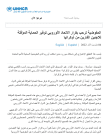Click to expand Image
Women and their children sit in the basement of a maternity hospital converted into a medical ward and used as a bomb shelter in Mariupol, Ukraine, February 28, 2022. The photo depicts neither Oksana or Mariia.
© 2022 AP Photo/Evgeniy Maloletka
Oksana’s voice breaks a bit on the phone: “My 11-month-old daughter became ill on the first day of the war.”
Every hour since has been a battle to keep Oksana’s daughter Mariia alive. What began with an intestinal infection has since turned into a medical condition that requires a mechanical valve to pump oxygen into her lungs. Oksana and Mariia are pseudonyms; the mother is too afraid to use their real names.
Between the ambulance ride to a hospital in southern Ukraine just over a week ago, to the many sleepless nights worrying about her daughter, Oksana has seen little of the Russian soldiers who took control of their city in recent days.
But she has very much felt the impact of the war. She has had to beg for cash from strangers to buy fast-disappearing medicine in pharmacies that no longer take credit cards. And she’s worried that her daughter won’t get the care she needs. Many nurses and doctors are sheltering at home, while others have fled the city. The hospital’s head doctor is unreachable. Everyone is afraid.
The doctors who remain haven’t been able to diagnose Mariia. “We could not do an MRI because the private clinic that usually does it is closed,” Oksana tells me.
Meanwhile, Mariia’s condition has worsened. She is now on a ventilator, unable to breathe on her own. “Whenever there are sirens, the doctors have to unplug her to go the basement, so they make her breathe manually through manual breathing support,” Oksana explains. Sirens are the only times Oksana get to see her daughter: “I have no access to the intensive care section, so I only see Mariia in the basement.”
The city they are in is now under the effective control of Russian forces, but the air raid sirens haven’t stopped. War continues. So do the trips down to the basement.
Both Russia and Ukraine have obligations to ensure access for humanitarian assistance to civilians and take all feasible steps to allow the civilian population to evacuate. The mayor in Oksana’s city has asked for a humanitarian corridor to allow in crucial food and medical supplies and to allow out vulnerable civilians.
Whether or not the parties can reach agreement on such a corridor, Mariia’s chances of survival are directly linked to parties respecting their wartime obligations to civilians.



